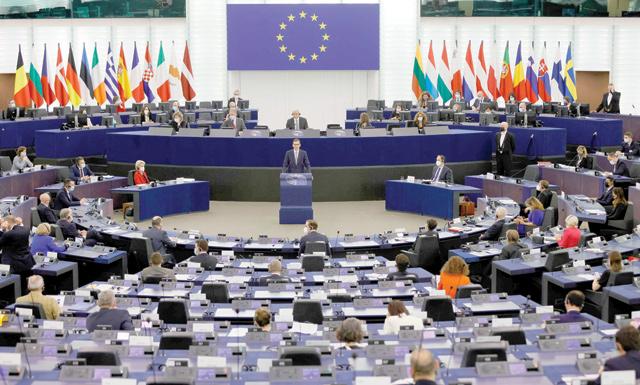You are here
Poland eyes Sunday shopping limits, bucking EU trend
By Reuters - Nov 08,2017 - Last updated at Nov 08,2017

Shoppers use escalators as they visit a shopping mall in Warsaw, Poland, on Monday (Reuters photo)
WARSAW — Poland plans to restrict Sunday shopping from next year, as the conservative government pushes ahead with what it sees as a return to Roman Catholic values.
The move runs against a trend of a slow liberalisation of Sunday shop hours throughout Europe, where retailers face pressure from a boom in online shopping.
Under the proposals that parliament is due to discuss this month, all but the smallest shops would be allowed to open for only two Sundays a month.
“This is the first step... and I hope we can move towards further restrictions,” said Janusz Sniadek, a ruling Law and Justice (PiS) Party lawmaker who is leading the legislation through parliament.
“The proposals should give families more time to spend together, to move away from spending it in shopping malls, something the church has been speaking about,” he told Reuters.
Since coming to power in 2015, the PiS has pursued policies that reflect patriotism infused with Catholic piety: ending state funding for in-vitro fertilisation, promoting awareness of natural family planning in schools, and restricting support for some organisations focusing on violence against women.
Poland’s Bishops’ Conference has welcomed the Sunday trading initiative, issuing a statement that said: “let’s not disregard God in public life and let’s not assume we have the right to organise national life as if God didn’t exist.”
Broad appeal
While Sunday shopping remains limited in some of the biggest economies in western Europe, it has bloomed in the east since the end of the Cold War, as people welcomed greater retail choice as a sign of economic success following years of shortages under communism.
But public support for curbs has grown in Poland where people work longer hours than in almost any other EU state.
Nearly two out of three Poles questioned in a 2016 survey by pollster CBOS supported partial restrictions, including more than 80 per cent of the PiS electorate.
The party swooped to power promising to make the economy fairer, appealing to the many voters who felt they were missing out on the benefits of post-communist reforms.
“I’d prefer a trading ban every Sunday,” said Katarzyna Bargielska, a 47-year-old cashier.
“I work every Saturday and every other Sunday. Sometimes I have only two days off a month and I make 430 euros ($500). A free Sunday would mean more time with my family.”
Retail operators are less keen.
“It will be a disaster for us and the food sector,” said Malgorzata Grycan, an owner of one of Poland’s biggest ice cream brands, Grycan.
“Most of our cafes are located in shopping malls which will be closed on Sundays. We have a tradition in Poland to go out for ice cream or cake with the family on Sunday.”
A survey by PricewaterhouseCoopers last year showed that sales could fall by about a billion euros a year if shops close every other Sunday. Economists say record low unemployment would cushion the impact on the labour market.
Hungary scrapped a ban on Sunday trade that had been in effect for little over a year in 2016 because it proved unpopular. In Greece, the International Monetary Fund has demanded shops open more as part of a bailout deal.
But in Poland, Economy Minister Mateusz Morawiecki said he would not oppose a ban that covered every Sunday, telling RMF radio: “Germany and France function this way, so why not?”
Related Articles
WARSAW — Poland’s governing right-wing populist party was poised to win a weekend election, latest results showed, and appeared on track to
STRASBOURG, France — Polish Prime Minister Mateusz Morawiecki accused the EU of "blackmail" on Tuesday in a public clash with European Commi
AMMAN — Amid soaring temperatures, more Jordanians are avoiding going out during midday hours and instead, they remain indoors in order to s



















